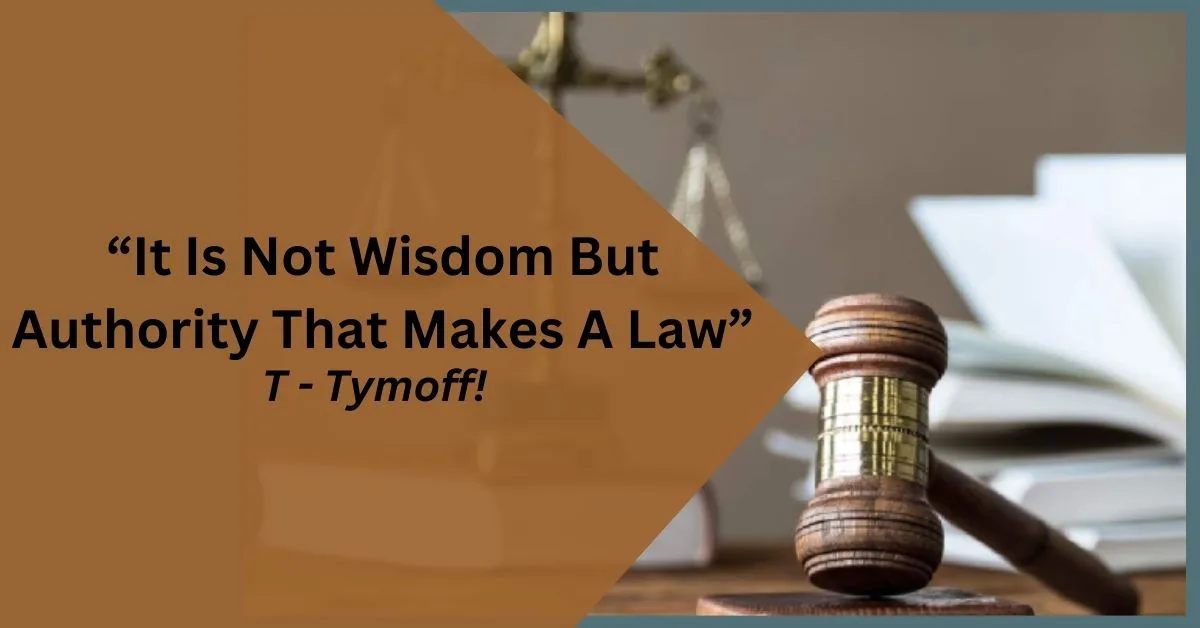It is not wisdom but authority that makes a law

it is not wisdom but authority that makes a law. t – tymoff
In a world increasingly driven by complex social dynamics, the relationship between authority and wisdom has come to the forefront of legal and philosophical discussions. The statement “It is not wisdom but authority that makes a law” prompts us to consider the nature of law itself: Is it the inherent wisdom behind a law that gives it value, or is it the authority that enacts and enforces it that ultimately defines its legitimacy? In this article, we will explore the implications of this statement, examining the roles of authority and wisdom in the legal system, the sources of law, and the consequences of prioritizing authority over wisdom.
Understanding Authority in Law
Authority in law refers to the power or right to enforce rules and regulations, typically vested in government institutions or officials. The legislative bodies, executives, and judicial systems are all manifestations of authority. When laws are enacted, they often reflect the will of those in power rather than a collective wisdom or moral imperative.
The Role of Legislative Bodies
Legislative bodies, such as parliaments or congresses, are the primary sources of law in most democratic societies. These institutions create laws based on political considerations, social pressures, and the prevailing values of the time. While some laws may embody principles of justice and equity, others can be reflective of the interests of powerful lobbies or specific societal factions.
This raises a critical question: Can laws created by authority truly be considered just or wise if they do not represent the greater good? The answer often lies in the process through which laws are formulated and the motivations driving lawmakers.
The Judiciary and Its Authority
The judiciary interprets and enforces laws, acting as a check on legislative and executive authority. However, the judiciary itself operates within a framework defined by the laws created by legislative bodies. While judges may possess a certain level of wisdom and legal acumen, their interpretations of the law can be heavily influenced by the authority under which they operate.
This interplay between legislative authority and judicial interpretation highlights a significant challenge: the potential for laws to become disconnected from the moral or ethical considerations that ought to guide them. When laws are treated as mere edicts from authority figures, rather than reflections of communal wisdom, the integrity of the legal system is at risk.
The Concept of Wisdom in Law
Wisdom, in the context of law, can be understood as the application of ethical principles, moral reasoning, and a deep understanding of human nature and society. It emphasizes the importance of justice, fairness, and the common good over mere compliance with rules.
The Ethical Foundation of Law
Philosophers like Aristotle and Plato argued that laws should be grounded in ethical principles. A law is not just a command; it must also be just and promote the welfare of the people it governs. This philosophical foundation suggests that wisdom should play a crucial role in law-making and enforcement.
In practice, however, this ideal often clashes with the reality of authority-driven law. Laws enacted without consideration for their ethical implications may lead to systemic injustices, disenfranchisement, and societal unrest.
Case Studies of Authority Over Wisdom
History is replete with examples where authority has triumphed over wisdom, leading to unjust laws and practices. The Jim Crow laws in the United States, for instance, were legally enacted yet fundamentally unjust, institutionalizing racial discrimination. Similarly, authoritarian regimes throughout history have enacted laws that violate basic human rights, demonstrating the dangers of placing authority above wisdom.
In these cases, the laws were upheld by those in power, yet they lacked the ethical foundation necessary to be considered just. The ramifications were profound, leading to societal divides, oppression, and civil unrest.
The Consequences of Authority Over Wisdom
The implications of prioritizing authority over wisdom in law are far-reaching. When laws are made without ethical consideration, they can lead to a lack of public trust in the legal system, increased social discord, and even the erosion of democracy.
Erosion of Public Trust
When individuals perceive laws as unjust or unfairly enforced, their trust in the legal system diminishes. This erosion of trust can result in non-compliance with the law, civil disobedience, and a general disregard for societal norms. Public confidence in institutions is essential for a functioning democracy, and when that confidence is undermined, the fabric of society begins to fray.
Social Discord and Civil Unrest
In cases where laws are perceived as oppressive or discriminatory, the consequences can manifest as civil unrest. Movements advocating for social justice often arise in response to laws that are seen as unjust, reflecting a collective rejection of authority that disregards wisdom. The civil rights movement in the United States serves as a poignant example, where individuals and groups challenged the authority of unjust laws, ultimately leading to significant legal and social reforms.
The Risk of Authoritarianism
Prioritizing authority over wisdom can also pave the way for authoritarian governance. When laws are enacted without consideration for ethical implications, it can lead to a concentration of power in the hands of a few. This concentration can result in a legal system that serves the interests of the powerful rather than the populace, stifling dissent and undermining the democratic process.
The Path Forward: Balancing Authority and Wisdom
To create a legal system that is both just and effective, it is imperative to find a balance between authority and wisdom. This balance can be achieved through several means:
Engaging the Public
Involving the public in the law-making process can help ensure that laws reflect the collective wisdom of society. Public consultations, forums, and participatory processes can give citizens a voice, fostering a sense of ownership and accountability in the legal system.
Encouraging Ethical Training
Integrating ethical considerations into legal education and training can help cultivate a generation of lawmakers and judges who prioritize wisdom alongside authority. By emphasizing the importance of justice, fairness, and moral reasoning, legal professionals can better serve society and uphold the integrity of the law.
Promoting Accountability
Instituting checks and balances within the legal system can help hold those in authority accountable for the laws they enact and enforce. Independent judiciary systems, oversight committees, and transparent processes can help ensure that authority does not override wisdom.
Conclusion
The assertion that “It is not wisdom but authority that makes a law” invites us to reflect critically on the nature of law and governance. While authority is necessary for the enactment and enforcement of laws, it is wisdom that imbues those laws with legitimacy and moral force. Read more articles…
